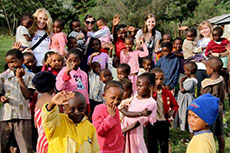August 16, 2012
Little things, big differences: Pre-nursing student assists doctors in Kenya during summer
Submitted by Communications & Marketing

It's the common experiences like routine doctor visits that Kansas State University student Allegra Gigstad, Nortonville, used to take for granted. However, an 11-day trip to Africa this summer changed her perception.
Gigstad, senior in pre-nursing and public health nutrition, was part of a 30-person medical team for Kansas2Kenya, which is directed and sponsored by the Episcopal Diocese of Kansas. Kansas2Kenya's mission is to work with other organizations to achieve millennium development goals in Kenya. Kansas State University has partnered with the organization since 2008.
In addition to Gigstad, the team included other students from across the state and a variety of medical professionals, including two Kansas State University alumnae: registered dietitian Audrey Monroe, Lawrence, a 2006 and 2010 graduate, and Christie Shofler, Topeka, a May 2012 bachelor's graduate in pre-nursing. Collectively, the medical team treated or diagnosed more than 1,130 patients with health problems ranging from hydroencephalitis -- water on the brain -- to farsighted vision.
"The ailments that Kenyans have are not much different than what we see here; however, their ailments are a lot more advanced because the majority of the people have never had medical care," Gigstad said. "If I get sick I'm going to go to the doctor within a few days, but if children in Kenya get sick, they may never see a doctor. If they do, it will be months if not years after symptoms begin."
Gigstad and Shofler worked in triage, checking patients in and gathering medical histories.
"It was one of the most moving and eye-opening experiences of my life," Shofler said. "Many people there had such simple illnesses and infections -- like pink eye -- that are easily taken care of with a $10 medication here in the United States."
Gigstad witnessed the team's pediatrician diagnose a 2-year-old and a 12-year-old with hydroencephalitis. In the United States, it is usually diagnosed early and doctors perform a simple procedure to drain the fluid. However, if the condition goes undetected and progresses past a child's younger years -- as it often does in Kenya -- it is incurable and fatal, Gigstad said. While it was heartbreaking for Gigstad to watch the doctor inform the older boy that he would die, doctors were able to help the 2-year-old.
"Seeing that side of health care, I have become more appreciative for the health care we have in the United States," Gigstad said. "It really struck me that people were so grateful for something as small as a pair of reading glasses for school. It was fun to see them get so excited."
As the medical team's registered dietitian, Monroe was passionate about educating the people on preventative measures that could be passed down to future generations to keep the population healthy.
"In Kenya I not only was able to counsel patients referred to me by the physicians about nutrition during specific disease conditions, but I also had the opportunity to provide group nutrition classes about general nutrition, nutrition for HIV and AIDS patients, breastfeeding, child nutrition and oral health," Monroe said. "This is information that can be shared among community members and passed down to new generations, making it a very sustainable way to promote optimal health."
Gigstad, Monroe and Shofler also applauded the resiliency of the Kenyan people.
"The more time I was there, the more I appreciated the opportunity," Gigstad said. "You definitely develop a different appreciation for their lifestyle. These people really have nothing but yet they are some of the happiest people I've ever encountered in my life, especially the children."
